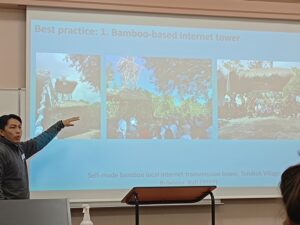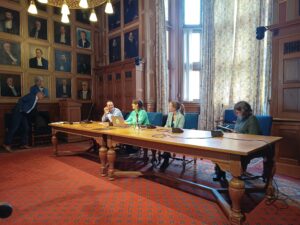General information
This conference was about citizens’ everyday experiences with digital inclusion and exclusion. Furthermore, this conference focused on the practices and tactics by which citizens deal with the increasing digitalization of their daily lives. Going beyond who is left behind or what skills or knowledge are lacking, it explicitly takes a user-centric approach to understand the impact of digital in-and exclusion from the perspective of citizens themselves. This approach showed that there are many diverse forms of digital inclusion and exclusion, all of which are related.
The goal of the conference was to gain an in-depth understanding of how citizens of different socioeconomic backgrounds, ages and education levels develop digital literacy throughout their lives and under what circumstances it becomes valuable for their participation and inclusion. The rationale behind this was that such user-centered approaches contribute to more knowledge about how digital literacy is developed from an early age, about the different social contexts in which these processes take place, and how such knowledge is appropriated, shaped and used in informal and formal everyday practices and environments. Moreover, emphasizing the development of digital literacies as a situated social practice, gives insights into the social contexts through which people develop digital literacy practices, how they construct and integrate social norms around technologies, and the links between digital literacies and (digital) citizenship.
Focused on these topics and approaches, we welcomed as many as 45 presentations and around 55 people from around the world. Presentations within the various panels covered the following topics:
- Practices and tactics of digital inclusion, digital exclusion, digital participation and/or digital literacy;
- Lived experiences and understandings of digital literacies;
- Differences between developing (digital/media) literacies in formal and informal learning spaces;
- Studying everyday experiences surrounding digital inclusion in different contexts;
- Conceptual tools for studying digital inclusion/exclusion in everyday life;
- Methodological challenges of researching digital inclusion and/or digital literacies in everyday life;
- Everyday uses and/or educational approaches to various literacies and participation;
- And other topics closely related to user-centric perspectives, digital inclusion and everyday-life practices and tactics.
Keynotes
We were pleased to welcome Prof. Renee Hobbs and Dr. Massimo Ragnedda to give keynote presentations on digital media education and socio-digital inequality. Where Prof. Hobbs took us through numerous American examples of how media education has been shaped based on discussions of, for example, American gun violence, Dr. Ragnedda gave us an insight into his latest research findings regarding socio-digital inequality in the United Kingdom. In doing so, Dr. Ragnedda gave examples that once again made it clear that social and digital inequality are intertwined, and you cannot isolate one from the other.
Presentations and Panels
In addition, there were numerous interesting presentations that highlighted insights from how local communities deal with digital inclusion, to the role religion plays in developing digital skills among marginalized subgroups, to the need to keep opportunity inequality in mind. For example, Dr. Subekti Priyadharma (Universität Erfurt, Germany) presented a very interesting study with the “periphery-centric approach” as its main theme, in which he argued that we need to look at the peripheries of social and digital societies in order to find out which subgroups within society are struggling to keep up with the digitization of social processes.

One example that Dr. Priyadharma gave in his presentation, for example, was how indigenous Indonesian communities themselves achieve digital inclusion by using local attributes (such as bamboo) to build “Internet towers” and provide themselves with access to the Internet. By studying such projects from other parts of the world, “we” in the West can get inspiration on how digital inclusion can be organized from the citizens themselves. The interesting thing about this is that in Europe, policies aimed at digital inclusion are mostly organized from institutional actors, with key themes and focal points within policy and education being formulated on the basis of academic research, socioeconomic developments and opinions. One thing that emerged in Dr. Priyadharma’s research is that this appears to work very differently in Indonesia, where local populations are taking matters into their own hands, looking at how best to organize digital inclusion on a local scale based on their own necessities, values and norms. This raises questions about how digital inclusion is organized in the West, and whether the necessities, desires and values of “vulnerable” citizens are brought forward enough.
There were also numerous interesting panels highlighting the importance of media education, social and digital inclusion, and digital skills. The conference concluded with a panel focused on making social impact, and how we can translate academic insights into policy and the social field. The panel consisted of (pictured left to right): Dr. Massimo Ragnedda, Karien Sondervan (Cybersoek), Dr. Joëlle Swart, and Dr. Ilse Mariën. Especially within the theme of the conference, such translation is essential, so that academic insights are not kept invisible, but rather used to strengthen policy and the social field. However, this proves difficult in practice because academic work is generally not very accessible to the broader public. So there is still a battle to be struck here, which the Digital Inclusion Lab also feels involved in. Next year, we will host several workshops that build on the themes raised in our conference. Keep an eye on our website for more news!
